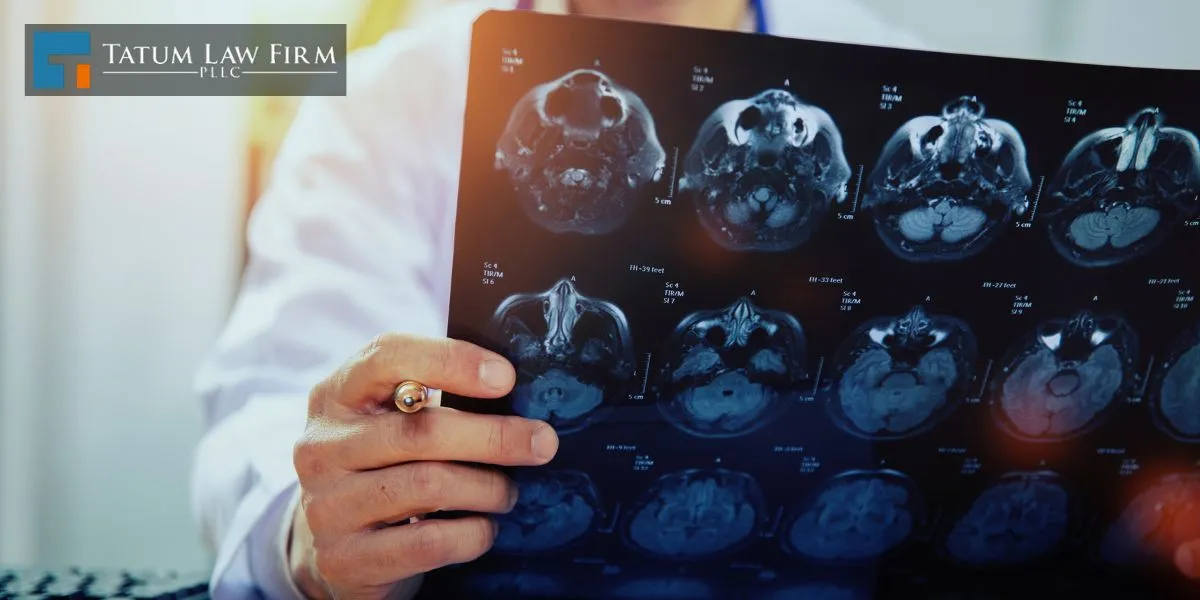North Carolina Traumatic Brain Injury Lawyer

North Carolina Traumatic Brain Injury Attorney
If someone is a traumatic brain injury victim or you yourself have experienced a serious brain injury, be sure to speak with a North Carolina traumatic brain injury lawyer about the legal options available to you. An experienced TBI attorney can guide you through the process and fight for your right to recover damages. The injury law professionals at Tatum Law Firm, PLLC, have successfully represented countless brain injury survivors over the years.
Traumatic Brain Injuries
Someone may suffer a TBI when a sudden, forceful accident inflicts physical harm to their brain. The term “traumatic brain injury” encompasses an array of various forms of brain damage ranging in severity and symptoms. Damage may be localized to one region of the brain or diffuse to more than one area.
Not all may cause long-term or permanent impacts on one’s brain functioning, but TBIs are among the most common causes of adult disability and fatality. A TBI is considered a penetrating or open brain injury or closed brain or head injury.
Closed brain or head injuries are known as Blunt brain injuries and are non-penetrating. In these instances, an external force hits the head, causing the brain to contort or bump around the skull. Penetrating TBIs, or open head injuries, entail a break in a person’s skull due to a foreign object, such as a bullet, shrapnel, or knife, that pierces through and causes subsequent damage to the brain.
TBIs also tend to be categorized by their severity. Mild TBIs are the most common form of brain injury but, unfortunately, still have the potential to cause significant issues and long-term effects. Mild brain injuries may also be referred to as a concussion. Moderate to severe TBIs are considered more serious and may worsen over time, causing long-lasting health complications.
Accidents Causing Traumatic Brain Injuries
A traumatic brain injury can take the form of numerous different circumstances that may lead to serious brain damage, including a simple fall incident. Some slip-and-falls can be particularly damaging because they are from a great height or when the person’s head collides with a stationary object such as the ground or a very hard surface. Even minor falls or tripping incidents can result in a moderate TBI.
Other situations that can result in a traumatic brain injury include a car accident, physical violence, and a workplace accident such as falling materials or injuries from heavy machinery work. In small children, traumatic brain injuries can occur because they are shaken erratically. This is sometimes referred to as shaken baby syndrome. No matter how the injury is suffered, any involvement with the head should be immediately evaluated by a medical professional.
Symptoms of Traumatic Brain Injuries
Whether someone’s recovering from a mild, moderate, or severe brain injury—the symptoms they may exhibit can range quite a bit. Everyone will be affected by brain damage differently, with different symptoms and symptom severity. Symptoms can also change over time, some improving while others worsen. There’s no question that a TBI can impact various areas of a person’s life. These are some effects one may experience after a traumatic brain injury:
- Physical/motor complications. Weakness in the arms or legs, diminished endurance, tremors, difficulty swallowing, muscle tightening and shortening (spasticity), paralysis, poor balance and coordination, inability to plan motor movements or difficulty performing basic actions like bathing or dressing (apraxia), inability to drive or operate machinery, losing consciousness, and in some cases: a comatose state
- Regulatory issues. Headaches, fatigue and problems over or under sleeping, changes in eating habits, nausea or vomiting, dizziness, loss of bowel or bladder control
- Sensory deficits. Changes in any of the five senses, such as a loss/heightened sense of touch, trouble understanding where one’s limbs are in relation to their body, inability to discern between left and right, double or blurred vision, limited range of vision, light sensitivity, hearing problems
- Cognitive problems. General confusion, trouble concentrating or thinking clearly, short attention span, decreased self-awareness or awareness of others, feeling slowed down or groggy, short-term memory loss, amnesia, difficulty recalling long-term memories, problem-solving and logical reasoning/judgment issues, little sense of time and space, inability to process multi-step tasks or abstract concepts
- Difficulties with communication and language. Trouble choosing the right words, understanding speech, or speaking in general (aphasia), problems with writing or reading, difficulty forming logical sentences, decreased vocabulary, slow or hesitant speech, issues with identifying objects and their uses
- Social, emotional, and psychiatric issues. Diminished or impaired social capacities such as becoming easily frustrated, unaware of inappropriate behavior, having trouble maintaining friendships or making new friends, difficulty understanding nuances of interpersonal relationships, feeling nervous or anxious, irritability, displays of aggressive or impulsive behavior such as difficulty with self-control, anger, sadness and depression, fluctuations in mood, diminished motivation, or apathy
Long-Term Ramifications of a Traumatic Brain Injury
A person whose brain has sustained damage of any degree is likely to be vulnerable to certain health complications and psychiatric disorders. It’s vital that you give yourself time to sufficiently heal after a head injury so you avoid a secondary brain injury or second-impact syndrome. Second-impact syndrome refers to when someone sustains a second brain injury before a previous one has time to heal, which can be life-threatening and cause brain swelling.
Secondary brain injuries develop over time following the initial accident or injury event, resulting in changes to one’s tissue, blood vessels, and other cellular or chemical changes in the brain. These developments can lead to further brain damage. Some examples include hypertension, insufficient blood flow or oxygen in the brain, and bleeding and swelling in the brain, causing brain cell displacement or loss.
Moderate to severe brain injuries have the potential to develop long-term repercussions such as seizures or epilepsy disorder, permanent disability or impairment, movement disorders, anxiety, depression, PTSD, Alzheimer’s disease, and chronic traumatic encephalopathy (CTE). Serious brain injuries are also associated with a shorter life expectancy.
Compensation for a Brain Injury Claim in NC
Speak with a seasoned North Carolina personal injury lawyer to see if you have a strong TBI claim. If your traumatic brain injury case is successful, you can receive financial compensation for the unnecessary harm caused. This compensatory payout covers the costs of your medical treatment, including any long-term care that’s needed, such as check-ups, physical therapy, and rehabilitation.
If you missed time at work while recovering from your injury, your settlement payment will also include your lost wages. You may also be compensated for loss of future income if your ability to work has been diminished. Your settlement is also likely to include damages for your physical pain and mental suffering.
FAQs
Q: What Should I Do If I Might Have a Serious Head Injury?
A: If after an accident where an object forcefully hit your head, your head collided against something hard, or your head was jostled around suddenly, be sure you seek professional medical attention as soon as you can. Not all damage may be noticeable or detectable with clinical resources right away, but it’s important for a doctor to check you out. This also creates a record of your head injury. Continue to monitor for any changes in your behavior or new symptoms.
Q: What Are Some Symptoms of a Mild Traumatic Brain Injury?
A: Some physical symptoms of a mild TBI include frequent headaches, fatigue or changes in your sleep habits, poor balance, dizziness, nausea, vomiting, and vision issues. Cognitive complications may entail confusion, feeling groggy or slowed down, short-term memory loss, difficulty recalling long-term memories, trouble thinking or communicating clearly, and problems concentrating or decreased attention span.
A mild TBI can also result in emotional dysregulation, causing anxiety and depression, apathy, loss of motivation, mood swings, irritability, anger, and aggressive or impulsive behavior.
Q: What Is the Average Settlement for a Traumatic Brain Injury?
A: There is no real average settlement amount for a traumatic brain injury case in North Carolina, since each individual’s situation can vary greatly. Many TBIs tend to yield a substantial settlement, but the specifics depend on the circumstances surrounding your injury, including how serious the symptoms are, the extent of the injury’s impact on your life, and the level of negligence that led to your TBI. It’s crucial to have a lawyer experienced in brain injury cases to maximize your compensation payout.
Q: Why Do I Need a Lawyer for a Brain Damage Injury Claim?
A: There are many benefits to entrusting an injury lawyer to manage your TBI claim. Personal injury claims, TBI cases in particular, are often highly involved and complex, so your attorney is there to streamline and simplify the process so it’s not unnecessarily dragged out. This includes handling your paperwork, court filings, and deadlines.
Your injury lawyer also has a deep understanding of what the court is looking for and what evidence is needed to establish your condition and right to compensation.
North Carolina Traumatic Brain Injury Lawyer
At Tatum Law Firm, PLLC, our team understands how important it can be to acquire a fair compensatory settlement and how stressful the undertaking can be. That’s why our team of legal professionals is here to help you and your family so you can move forward more easily with the numerous issues a TBI can bring. Contact our office today to speak with a skilled injury attorney about your case.






